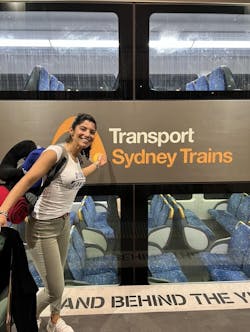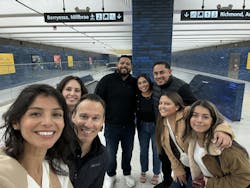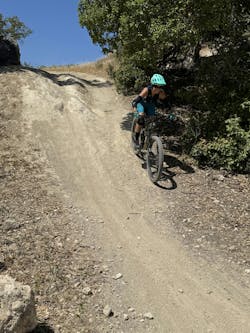One word to describe yourself: Committed
Alma Mater: UCLA
Fast fact about yourself: Whenever I visit a new city, I have four must-dos (if available): try transit, run a 5K, attend a sporting event and/or shop at Costco.
What’s your best experience on transit and what made it memorable? Riding the Pacific Surfliner has been one of my most memorable transit experiences. While living in Los Angeles, it was truly a rare gem—you couldn’t go wrong heading in either direction. Although there's room for improvement in frequency, the route itself, especially the stretch between Santa Barbara and San Diego, is breathtaking. With sweeping ocean views and a relaxed onboard atmosphere, it’s easily one of the most scenic rail journeys in the world. It reminded me that transit can be more than just functional—it can also be inspiring.
Ruby Horta, assistant general manager, Central Contra Costa Transit Authority (County Connection), started out as an administrative coordinator in Kern County, Calif., within the transit department. While at Kern Transit, she took on many roles that allowed her to acquire a wide variety of skills from addressing customer concerns to planning and implementing service changes and capital projects, including being part of a team that managed to rebrand the agency, deliver new buses, implement new service, launch a new website and increase revenue sources all within a matter of a few months.
A few years into that role, she attended a transit conference where she met her future bosses. In 2015, she accepted a job at County Connection as the manager of planning. In that role, she was primarily responsible for service development. However, she saw an opportunity to better integrate the role of service development with operations and maintenance, opening communication channels that would elevate her position within the agency.
Her next role at the agency started in 2017 as the director of planning and marketing, where her team completed a comprehensive operational analysis). At County Connection, Horta has been instrumental in leading major service and capital projects. She led a team that implemented a major service restructure and fare modification in 2019. Immediate ridership gains were evident, and by February 2020, year-to-date ridership was up 12.9 percent over the prior year.
Horta helped develop a route extension that offers passengers direct service to a major hub, reducing their travel time and eliminating the need to transfer. During the COVID-19 pandemic, she developed a new service prioritization system overnight to ensure resources were responsive to the changing needs. On the capital side, she prepared the agency’s zero-emissions bus rollout plan to meet the California Air Resources Board’s Innovative Clean Transit rule. She has also been responsible for several grant awards to offer fare-free routes to underserved communities and the purchase of zero-emission vehicles.
She earned her bachelor’s degree in international economics and a master’s degree in urban planning, both at UCLA. While at UCLA, she focused on transportation issues while interning at a community development agency. Since entering the transit industry, she has expanded her educational acumen by completing the University of the Pacific’s Transit/Paratransit Management Certificate Program. In addition to her educational advancement, she has participated in multiple leadership programs offered by local, state and national associations, including Leadership Contra Costa, the California Association of Councils of Governments California Academy for Regional Leaders and the Eno Center for Transportation Transit Senior Executive Program.
Horta is an avid transit rider who engages passengers on the system she is responsible for on a regular basis to ensure the service is responsive to their changing needs. She has moderated and presented at various conferences, including the American Public Transportation Association, the California Transit Association and the California Association for Coordinated Transportation. She serves as an alternate on regional bodies, with responsibilities ranging from land use and housing to fare payment and accessibility.
Her recent work on the Accessible Transportation Strategic Plan Task Force redirected efforts to better address the local needs in accessing transit by all. As an UCLA alumna, she continues to give back to the groups that fostered her growth. She is also engaged with the UCLA Alumni Mentor Program, connecting with current UCLA undergraduate students. She has participated in community organization forums, conferences and webinars focused on women, leaders and the underserved.
Is there a specific experience that led you to where you are today?
It’s tough to pinpoint just one experience, but if I had to, it would be eighth grade Algebra. I was fortunate to have a teacher who cared about his students far beyond the equations. He understood the power of dialogue and the importance of diverse voices and perspectives, something that was hard for me to fully grasp at the time, especially as an introvert. That lesson has stayed with me, shaping both my educational and professional journeys.
What do you enjoy most about your job?
Everything but the politics. I truly enjoy the days that my schedule affords me the time to ride my own system to work. Walking or biking to the bus stop is the first leg of my journey and the only solo segment. Once at the bus stop, I am either encountered by a familiar fellow rider or greeted by one of our amazing operators. While on route, I think about what’s working and what can be improved. It’s rewarding knowing that each one of our employees has a part in getting someone to work, school, an appointment or any kind of leisure trip you can imagine.
What’s the most challenging part of your job?
Commuicating the complexities of transit from funding to planning and operations to labor negotiations in an easily digestible way to generate public support.
What is the accomplishment you’re most proud of and why?
Professionally, the fare and service restructure we implemented in 2019, which was a strategic response to persistent funding challenges. Despite resulting in a 10 percent reduction in overall service, the changes led to a notable double-digit increase in ridership.
By prioritizing high-demand corridors, simplifying the fare structure and reducing the need for transfers, we significantly enhanced the overall rider experience. This outcome demonstrates the impact of targeted investments and data-driven planning even in the face of constrained resources.
What is an accomplishment you would like to work towards in your career?
I would like to work toward becoming a leader who actively shapes and promotes a positive, inclusive and supportive work culture. I’m really interested in enhancing my skills, particularly in communication, emotional intelligence and team development to help foster environments where collaboration, innovation and employee well-being thrive. Creating a culture where each member of the team feels valued and empowered not only improves morale but also drives better outcomes for the organization.
What is your best advice/tip/best practice you can share from your area of expertise?
Seek mentorship at every stage of your career. To this day, I still stay in touch with—and occasionally visit—my eighth grade Algebra teacher. The people who invest in your growth often continue to support and inspire you long after the initial connection.
Just as importantly, pay it forward. Whether it's giving a presentation at your former high school, joining an operator for a ride-along or bringing donuts to thank your mechanics, never underestimate the value of acknowledging the human side of our work. Strong relationships and small gestures of appreciation can have a lasting impact and are essential to building a resilient and connected workforce.
About the Author
Brandon Lewis
Associate Editor
Brandon Lewis is a recent graduate of Kent State University with a bachelor’s degree in journalism. Lewis is a former freelance editorial assistant at Vehicle Service Pros in Endeavor Business Media’s Vehicle Repair Group. Lewis brings his knowledge of web managing, copyediting and SEO practices to Mass Transit magazine as an associate editor. He is also a co-host of the Infrastructure Technology Podcast.




